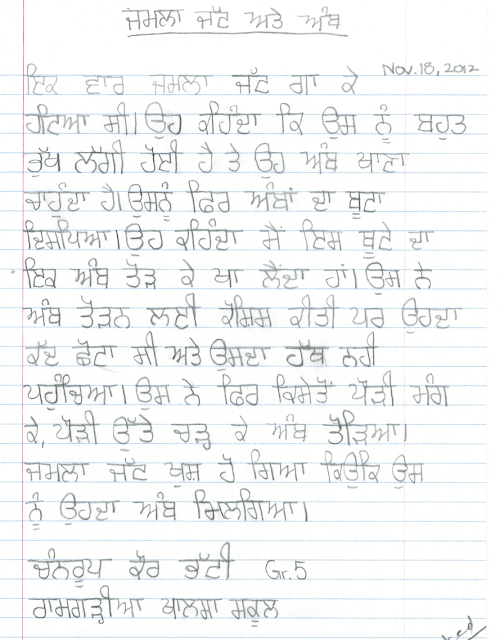-->
By Savithri Machiraju Teacher from Telugu School
What's the English word for the
father-in-law of your son in relation to you?
How
many seasons are there in a year?
What
are the six basic flavours out of which all the different taste combinations
can be created in cooking?
If
the only language one know is English, one might answer the above questions as
“I don't know”, “four”, and “I thought there were only four basic flavours?”
But
if one also knows the Telugu language from India, one could correctly answer, “viyyankudu”,
“six”, and “salt, spicy hot, sweet, bitter, sour, and vagaru.”
We
see from this that, even a cursory study of a language tells us a lot about the
culture and even geography and climate from which it sprang.
The
fact that a word like viyyankudu exists (along with different words for
elder brothers and sisters and younger brothers and sisters, elder and younger
uncles and aunts, uncles and aunts who are one's father's siblings and one's
mother's siblings, and so on) tells us how important family relationships are
in the Telugu culture, and moreover, that the concept of “family” extends far
beyond those who have a blood relationship to oneself.
The
fact that there are six seasons in a year (season of re-blossoming of trees,
season of heat, season of rains, season of clear moonlight, season of falling
leaves, season of cold) tells us, first, that this culture developed in a
latitude much closer to the equator than the northern latitudes where only four
seasons were observable, and second, tells us that the people here had,
perhaps, a closer relationship with nature and its changes.
Similarly,
having six basic flavours versus four (salt, sweet, bitter, sour), indicates a
greater variety of fruits, vegetables, and spices in southern India (where
Telugu originated) than in northern Europe (where English originated). See how much we learned about Telugu culture
with just 13 words!
It
is often claimed that English has the largest vocabulary of any language in the
world – mainly because it has co-opted many words from other languages and
calls them its own – but I have found on many occasions that there is no exact
translation for certain Telugu words. This is not to denigrate English, but to
celebrate the richness of the variety of human experience that leads to forms
of expression that can be widely or subtly different.
The
tremendous importance of language as the keeper of culture can be seen by the
fact that almost every colonizer or conqueror sought to eradicate the language
of the conquered people first in order to subjugate them. This happened with the aboriginal populations
of North and South America and Australia, and with the Africans brought to the
Americas as slaves.
Though
learning a second language may seem like a daunting challenge at first, it has
many benefits. If one travels to the country of origin of the language, it
allows the traveller to converse with a wide variety of people, and not be
restricted only to those who speak English, who often represent a small and
restricted cross-section of that society.
Even if one cannot travel and meet the native speakers of the language
in person, one can still read the books of that culture in their original
language, rather than translation, and get the full flavour of the writing. More importantly, it opens up the entire
history of a people through the ages in their own words, and not as others see
them.
For
children growing up in a country and language different from that of their
parents, knowing their heritage language serves as a bridge to understanding their
cultural heritage; through their ability to converse with elder relatives, they
can get the oral history of their family and also learn about their heritage
country via its popular art forms such as films and music.
Finally,
for children or adults, knowing more than one language and culture broadens
one's perspective of the world, and leads to better understanding of people
with a different point of view. And
better understanding will lead to reduced conflict in the world.
































